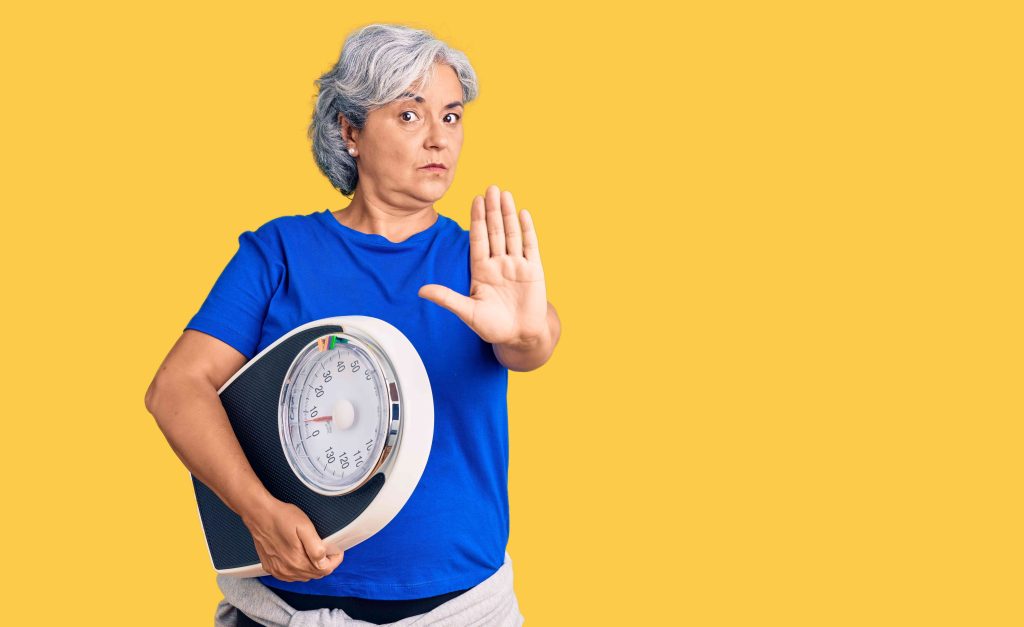The best ways to lose weight according to science
To lose weight, I examine my lifestyle/habits and draw inspiration from the latest scientific studies. I sweep away preconceived ideas and turn to solutions that work! I want to reach my ideal weight and maintain it over time by reducing my body fat while maintaining my muscle mass.
I take my time and don’t focus on the scale

To lose fat, I have to burn more calories than I consume. But before I throw myself into a drastic diet or physical activity that doesn’t suit me, I take into account the results of recent scientific studies:
- Losing weight slowly is the most effective way to improve body composition: to lose fat and not gain weight again, I aim to lose 0.5 to 1 kg per week, no more.
- Weight loss methods based on a low-calorie diet (less than 1200 calories per day) are often doomed to failure in the long term. In one study, contestants from The Biggest Loser were contacted again to find out whether their dramatic weight loss had been maintained 6 years after their participation in the game show. In 70% of the cases, they had regained the lost weight or more.
I am patient and focus on my diet, sleep and training plan to find my own balance.
I get enough sleep… but not too much!

Not getting enough sleep is associated with a higher risk of becoming overweight in the future, according to a study of more than 68,000 women over 16 years. Another publication suggests that women under 40 who sleep more or less than average are likely to gain more weight than others. To maximise my chances of maintaining my healthy weight, I aim for 6-8 hours of sleep per night.
The quality of sleep is also important: one study shows that those who feel they sleep well are 33% more likely to succeed in their weight loss programme. Sleep sets in motion a series of hormonal reactions: when I am not well-rested, I have a bigger appetite, and I am more stressed.
I prepare my meals with care

I start by determining how many calories my body needs at rest (for digestion, sleep, breathing, etc.), depending on my age, height, weight, etc. I can use an online calculator to work it out. Then, I add the energy expenditure linked to physical activity.
I aim for a deficit of about 150 to 300 calories to lose weight gradually.
Recent research suggests that incorporating a little more protein and a little less carbohydrate than usual, but maintaining a normal fat intake, may work better than cutting out too much fat. Protein has a satiating effect and supports muscle building. I balance my menus with 35% to 50% carbohydrate, 25% to 35% fat and 20% to 30% protein.
To stay healthy, the quality of food is also crucial: I prefer complex carbohydrates to sweets, vegetable oil to animal fats and so on.
I spread my training: muscle-building, HIIT and cardio

All I have to do now is balance my schedule with the most effective workouts to eliminate fat:
- Strength training: one study estimates that 10 weeks of strength training can increase lean body mass by 1.4 kg, increase resting metabolic rate by 7% and lose 1.8 kg of body fat.
- High-intensity interval training (HIIT, Tabata, sprinting, etc.): according to the latest research, this is more effective than endurance activities for fat loss.
- Don’t forget about cardio: moderate exercise, such as walking, running or cycling, increases my energy expenditure for the day and improves my fitness.
It’s all about balance: I don’t change my lifestyle radically. I just need to understand how my body works to start a successful weight loss journey. One last study we liked? Mindfulness meditation can also help you lose weight. The subjects observed lost up to 3% of their weight, with better results over time when they practised mindfulness.
For more tips and information on your fitness goals – Visit our other articles
Sources:
https://pubmed.ncbi.nlm.nih.gov/18025815/
Strasser B, Spreitzer A, Haber P. Fat loss depends on energy deficit only, independently of the method for weight loss. Ann Nutr Metab. 2007;51(5):428-32. doi: 10.1159/000111162. Epub 2007 Nov 20. PMID: 18025815.
https://www.ncbi.nlm.nih.gov/pmc/articles/PMC5702468/#A13249REF9
Ashtary-Larky D, Ghanavati M, Lamuchi-Deli N, et al. Rapid Weight Loss vs. Slow Weight Loss: Which is More Effective on Body Composition and Metabolic Risk Factors?. Int J Endocrinol Metab. 2017;15(3):e13249. Published 2017 May 17. doi:10.5812/ijem.13249
https://pubmed.ncbi.nlm.nih.gov/27136388/
Fothergill E, Guo J, Howard L, Kerns JC, Knuth ND, Brychta R, Chen KY, Skarulis MC, Walter M, Walter PJ, Hall KD. Persistent metabolic adaptation 6 years after “The Biggest Loser” competition. Obesity (Silver Spring). 2016 Aug;24(8):1612-9. doi: 10.1002/oby.21538. Epub 2016 May 2. PMID: 27136388; PMCID: PMC4989512.
https://pubmed.ncbi.nlm.nih.gov/16914506/
Patel SR, Malhotra A, White DP, Gottlieb DJ, Hu FB. Association between reduced sleep and weight gain in women. Am J Epidemiol. 2006 Nov 15;164(10):947-54. doi: 10.1093/aje/kwj280. Epub 2006 Aug 16. PMID: 16914506; PMCID: PMC3496783.
https://www.ncbi.nlm.nih.gov/pmc/articles/PMC3632337/
Beccuti G, Pannain S. Sleep and obesity. Curr Opin Clin Nutr Metab Care. 2011;14(4):402-412. doi:10.1097/MCO.0b013e3283479109
https://pubmed.ncbi.nlm.nih.gov/15867892/
Schoeller DA, Buchholz AC. Energetics of obesity and weight control: does diet composition matter? J Am Diet Assoc. 2005 May;105(5 Suppl 1):S24-8. doi: 10.1016/j.jada.2005.02.025. PMID: 15867892.
https://jamanetwork.com/journals/jamainternalmedicine/article-abstract/2759134
Shan Z, Guo Y, Hu FB, Liu L, Qi Q. Association of Low-Carbohydrate and Low-Fat Diets With Mortality Among US Adults. JAMA Intern Med. 2020;180(4):513–523. doi:10.1001/jamainternmed.2019.6980
https://pubmed.ncbi.nlm.nih.gov/22777332/
Westcott WL. Resistance training is medicine: effects of strength training on health. Curr Sports Med Rep. 2012 Jul-Aug;11(4):209-16. doi: 10.1249/JSR.0b013e31825dabb8. PMID: 22777332.
Trapp, E., Chisholm, D., Freund, J. et al. The effects of high-intensity intermittent exercise training on fat loss and fasting insulin levels of young women. Int J Obes 32, 684–691 (2008). https://doi.org/10.1038/sj.ijo.0803781
Boutcher SH. High-intensity intermittent exercise and fat loss. J Obes. 2011;2011:868305. doi:10.1155/2011/868305







